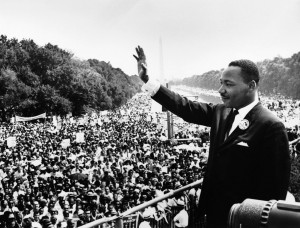You don’t have to look far to see the continued relevance of Dr. Martin Luther King, Jr.
Peaceful protesters marching in the streets from Ferguson, to New York, to Seattle are a visual reminder of Dr. King’s legacy of using nonviolent protest to demand change. Calling for criminal justice reform and police accountability, people from across the country have joined together to send the powerful message that black lives matter.
As we continue to grapple with the challenges of institutional and structural racism—and their resulting impact on poverty, health, housing, education, and criminal justice to name a few—I am constantly brought back to the teachings of Dr. King.
A firm advocate of creating an interconnected movement that acknowledges our shared fate and our common humanity, Dr. King laid the groundwork for organizing across communities and across issues.
In a society that is constantly trying to fragment and divide us, it is more important than ever that we find ways to support and elevate those that remain most invisible and vulnerable. Within the LGBTQ movement, that means a clear and explicit focus on reducing the disparities faced by LGBTQ people of color, transgender people (and particularly transgender people of color), and those that remain isolated due to geography.
That is why Pride Foundation restructured our grants program and clarified our priorities last year. We knew that in order to keep up with the rapidly changing landscape, it was necessary to be intentional about where we direct our resources and grant dollars.
While we continue to make rapid progress toward marriage equality across the country, we need to use that momentum to bring equality to everyone in our community. Building the foundation for lasting LGBTQ equality takes time. It takes hard work, and it challenges all of us to find new ways to elevate and support the varied and diverse experiences of LGBTQ people across our region.
None of this will be possible without forming partnerships—with organizations focused on racial justice, immigrant rights, economic justice, and reproductive justice. Showing up for broader social justice work, even when the connection to LGBTQ rights might not be clear or straight-forward, acknowledges that our values around humanity and dignity are universal. Merging our fight for LGBTQ equality with the voices of others helps create a stronger, more comprehensive movement for justice.
As Dr. King so eloquently put it, “Injustice anywhere is a threat to justice everywhere. We are caught in an inescapable network of mutuality, tied in a single garment of destiny. Whatever affects one directly, affects all indirectly.”
We have accomplished so much together since Pride Foundation was founded 30 years ago. And while I am a firm believer in celebrating the incredible progress that we have achieved, I am also grounded in the work that lies ahead.
Dr. King taught us the importance of enduring—that justice will not happen overnight, nor will it be handed to us. When I think about this moment in the LGBTQ movement, I know that we are at a crossroads. What we do next will be critical in defining what the future looks like for our community.
My hope is that we find new and creative ways to come together, build partnerships, and share our stories. That we challenge the status quo, including the structures and institutions that keep too many in our society marginalized and oppressed. That together, we forge a new path that allows everyone in our community the opportunity to live openly, safely, and with hope.
Kris Hermanns is the Executive Director of Pride Foundation. Email Kris.
